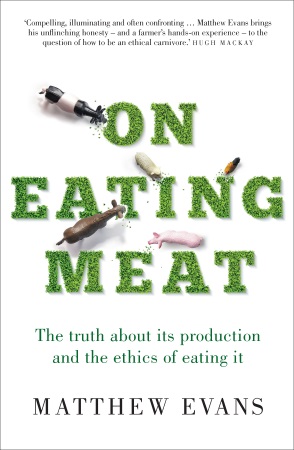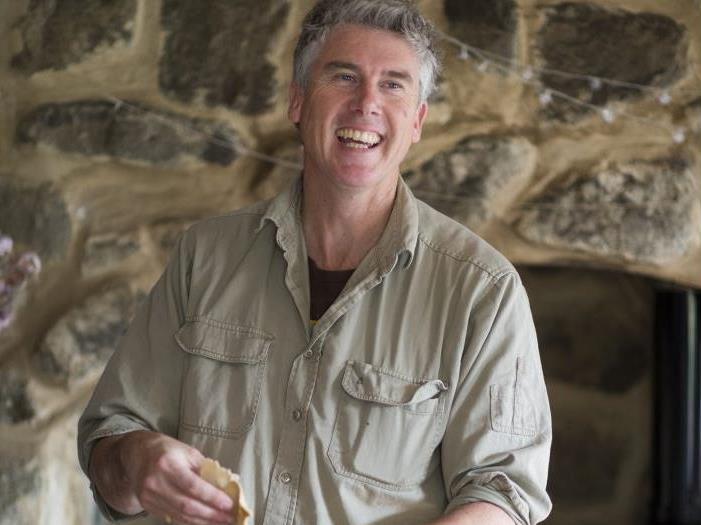Author Matthew Evans. Image supplied.
There is no doubt that Matthew Evans is qualified to write about food. He is well known as a chef and food critic, and more recently he has turned to farming. The SBS series Gourmet Farmer, which features Evans’s Fat Pig Farm, is now into its fifth season. On Eating Meat is a philosophical sequel of sorts to For the Love of Meat, Evans’s 2016 book based on a documentary of the same name.
Each chapter of On Eating Meat concentrates on a different aspect of the meat industry, such as animal cruelty, land use, climate change, hunting, antibiotic use, and what constitutes ‘good meat’. Each chapter is relatively self-contained – the advantage of this is that they can be read independently, but it does result in some repetition of facts and comments.
Arguably the most important consideration of eating meat is the cruelty inflicted on animals in the interest of low-cost production. Evans describes in some detail many of these atrocious practices, particularly by large food producers ‘behind locked gates and large biosecurity signs’.
Evans acknowledges the role that vegans and vegetarians play in regard to animal welfare, although he points out some inconsistencies in their behaviour. He reasons, for instance, that people who drink milk should be happy to eat veal, because both of these foods stem from the same cruel act – depriving a cow and its calf of their natural relationship. He mentions that growing a crop of peas requires a farmer to kill many animal predators in order to protect the crop. But these logical inconsistencies do not prevent Evans from quoting research favouring vegan and vegetarian diets, such as the lower rates of carbon dioxide production compared to meat-rich diets.
Evans points out that ‘our insatiable appetite for meat’ makes the average Australian diet unsustainable on a global scale. What Evans favours is producing much less meat and producing it in an ethical manner. He argues that meat from animals that have led a satisfying life, on a diet suited to the way they have evolved, tastes much better, provided the animal has a stress-free death. And he points out the ‘amazing ability of any animal to produce human food from stuff we can’t eat, like grass’ – the point being that land not capable of producing crops for human consumption can produce food suitable for animals which can then be eaten by humans.
Evans’s research does not cover the ‘pestatarian’ diet, although the idea of using invasive species as a meat source (such as camel, pigeon or even cane toad) has been gaining publicity in Tasmania, where Evans’s Fat Pig Farm is located. Whether this trend will take off is yet to be seen, but according to a recent article in Good Food, the concept is compelling for those environmentally conscious meat-abstainers longing for a steak.
Evans practises what he preaches. He is truly appalled by the cruelty inflicted on animals by most meat producers, and believes that meat-eaters have a responsibility to fix this problem. He wrote On Eating Meat to promote awareness of our responsibility as consumers, and what we can do to prevent cruelty to the animals that are being bred for human consumption.
Regardless of whether we are meat-eaters, vegetarians or vegans, there is much we can learn from this book. Evans may not have all the answers, but he certainly asks the right questions.
4.5 stars out of 5 ★★★★☆
On Eating Meat by Matthew Evans
Publisher: Murdoch Books
ISBN: 9781760637699
Format: Paperback
Categories: Australian | Non-fiction
Pages: 312
Release Date: 1 July 2019
RRP: $32.99






